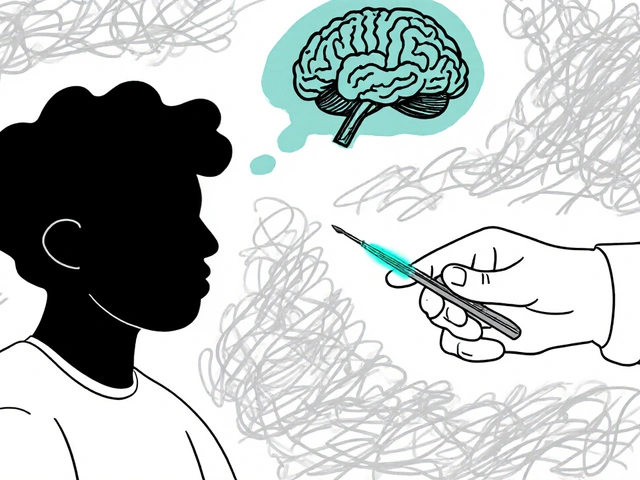Oct
6

- by Gareth Harington
- 12 Comments
Pregnancy Loss Types Explorer
Select a type of pregnancy loss below to learn more about its characteristics, causes, and emotional impact.
Miscarriage
Before 20 weeks
Stillbirth
20 weeks or later
Ectopic Pregnancy
Outside the uterus
Miscarriage Details
Typical Gestational Age: Before 20 weeks
Common Causes: Chromosomal abnormalities, hormonal issues, uterine anomalies
Typical Emotional Impact: Shock, guilt, fear of future conception
When a pregnancy ends unexpectedly, the physical loss is only part of the story; the emotional aftermath can feel like an endless loop of questions, guilt, and sadness. Whether the loss happened in the first weeks or after a full term, you are left navigating a maze of medical follow‑ups, grieving processes, and the hope of trying again. This guide walks you through what pregnancy loss looks like, how grief shows up, and practical steps to heal while keeping your future fertility on the radar.
Key Takeaways
- Recognize the different types of pregnancy loss and what medical check‑ups are recommended.
- Understand the stages of grief and why it isn’t a straight line.
- Learn when and how to seek professional counseling or join a support group.
- Know the hormonal changes that follow loss and how they affect your body.
- Get a realistic timeline for when it’s safe to try for another pregnancy and what prep steps help.
What Is Pregnancy Loss?
Pregnancy loss is the ending of a pregnancy before the baby can survive outside the womb, encompassing miscarriage, stillbirth, and ectopic pregnancy. Miscarriage usually occurs before 20 weeks, stillbirth after that point, and ectopic pregnancy happens when the embryo implants outside the uterus, most often in a fallopian tube. Each type carries its own medical considerations, but the emotional impact often overlaps.
The Grieving Process
Grief is a multifaceted emotional response that can include denial, anger, bargaining, depression, and acceptance, but it rarely follows a neat, predictable order. One day you might feel numb; the next, a wave of guilt crashes in. Common pitfalls include isolating yourself, suppressing feelings, or expecting "to get over it" quickly. Validating each emotion, journaling, or simply allowing yourself to cry can break the cycle of self‑judgment.

Professional Help: Counseling and Support Groups
Counseling is a structured therapeutic process led by a licensed mental‑health professional, aimed at processing loss, reducing anxiety, and building coping skills. A therapist experienced in reproductive grief can help you identify triggers, develop grounding techniques, and reframe intrusive thoughts. If one‑on‑one feels intimidating, consider a support group is a community of individuals who have experienced similar losses, offering shared stories, resources, and empathetic listening. Many hospitals host monthly meetings; online forums also provide anonymity and 24/7 access.
Medical Follow‑Up: Evaluation and Hormonal Changes
After a loss, a medical evaluation is a series of tests-ultrasound, blood work, and possibly genetic analysis-to determine why the pregnancy ended and to rule out underlying health issues. Your doctor may check hormone levels, especially progesterone and hCG, which often dip sharply after loss. These hormonal changes are natural fluctuations that can cause mood swings, fatigue, and irregular periods. Understanding that these shifts are temporary can ease anxiety when your cycle resumes.
Planning Future Fertility
When you feel ready, future pregnancy planning is the process of timing, health optimization, and emotional preparation for trying to conceive again. Most experts recommend waiting at least one normal menstrual cycle before attempting conception, giving your uterus time to heal and hormone levels to stabilize. However, there is no universal “right” timeline-listen to your body and your emotional readiness. Pre‑conception steps include:
- Scheduling a pre‑pregnancy check‑up to assess thyroid, iron, and blood sugar levels.
- Adopting a balanced diet rich in folate, omega‑3s, and antioxidants.
- Managing stress through mindfulness, yoga, or light exercise.
- Discussing any past genetic findings with a specialist, if applicable.

Types of Pregnancy Loss: Quick Comparison
| Loss Type | Typical Gestational Age | Common Causes | Typical Emotional Impact |
|---|---|---|---|
| Miscarriage | Before 20 weeks | Chromosomal abnormalities, hormonal issues, uterine anomalies | Shock, guilt, fear of future conception |
| Stillbirth | 20 weeks or later | Placental problems, infections, maternal health conditions | Deep grief, trauma, complicated mourning |
| Ectopic Pregnancy | Usually 6-10 weeks (outside uterus) | Fallopian tube damage, prior tubal surgery, PID | Urgent anxiety, fear of reproductive health |
Building a Support Network
Beyond formal therapy, lean on friends, family, and partners who respect your pace. Share your story only when you feel safe; vague statements like "I need some space" can set boundaries without oversharing. If your partner also feels loss, consider joint counseling-shared grief can either pull you together or amplify tension if left unaddressed. Online platforms dedicated to reproductive loss often host moderated chats, resource libraries, and memoirs that normalize your feelings.
Everyday Self‑Care Practices
Simple habits can ground you during turbulent moments:
- Maintain a regular sleep schedule; aim for 7-9 hours.
- Practice gentle movement-walking, prenatal yoga, or stretching.
- Create a ritual to honor your loss-lighting a candle, planting a seed, or writing a letter to the baby.
- Limit alcohol and caffeine to reduce mood swings.
- Seek nutritional supplements (e.g., iron, vitamin D) if your doctor advises.
Remember, healing isn’t linear. Some days you’ll feel hopeful; others, you might need extra support. Checking in with yourself regularly and adjusting your plan keeps you in control of the journey.
Frequently Asked Questions
How long should I wait after a miscarriage before trying again?
Most clinicians advise waiting at least one normal menstrual cycle, which gives the uterus time to heal and hormone levels to reset. However, emotional readiness varies; it’s okay to wait longer if you need more time.
Is it normal to feel guilty after a stillbirth?
Yes. Guilt is a common reaction, even though the loss is often due to factors beyond your control. Talking with a therapist who specializes in perinatal grief can help reframe these thoughts.
What medical tests should I ask for after an ectopic pregnancy?
Your doctor may recommend a repeat beta‑hCG test to ensure levels drop, a pelvic ultrasound to confirm the ectopic tissue is gone, and a tubal patency test (hysterosalpingography) if future fertility is a concern.
Can joining an online support group replace in‑person counseling?
Online groups provide community and shared stories, but they aren’t a substitute for professional therapy when you need personalized coping strategies or have severe anxiety or depression.
What lifestyle changes boost fertility after a loss?
Focus on balanced nutrition, maintain a healthy weight, manage stress, get regular exercise, and ensure you’re up to date on vaccinations. A pre‑conception visit can tailor recommendations to your specific health profile.






12 Comments
Deepak Bhatia
Take it one day at a time, and give yourself permission to feel whatever comes.
Jessica Forsen
Yeah, because pretending grief follows a neat schedule is just brilliant. You’ll have a “good day” tomorrow, and then a panic attack at 3 AM because your hormone levels decided to throw a party. The trick is not to expect the timeline to be a straight line – it’s more like a roller‑coaster you never signed up for. So, sip that tea, let the tears flow when they need to, and stop judging yourself for the mood swings.
Vandita Shukla
First off, you need to understand that pregnancy loss isn’t just a medical event; it’s a profound emotional upheaval that ripples through every aspect of your life. The grief can feel like a phantom limb – you’re missing something that never fully formed, yet the absence is painfully real. Hormonal fluctuations after a loss can wreak havoc on mood, sleep, and even appetite, so it’s normal to feel exhausted and irritable.
One of the most crucial steps is to give yourself explicit permission to mourn. Society often tells us to “move on” quickly, but grief doesn’t have a deadline. Journaling, creating a memory box, or lighting a candle are simple rituals that validate your loss and provide a tangible way to honor it.
Don’t underestimate the power of professional help. A therapist with experience in reproductive loss can teach you grounding techniques, help you reframe intrusive thoughts, and provide a safe space to process guilt that often sneaks in uninvited. If one‑on‑one therapy feels too intense, look for a support group – the shared stories can remind you that you’re not alone in this labyrinth.
Medical follow‑up is equally important. Ask your doctor for a comprehensive evaluation: ultrasound, blood work, and possibly genetic testing can pinpoint potential causes, especially if you’ve had multiple losses. Understanding the underlying reason, if any, can reduce the feeling of random bad luck and give you actionable steps for future pregnancies.
When you feel ready, pre‑conception care becomes the next pillar. Schedule a check‑up to assess thyroid, iron, and blood sugar levels; these are often overlooked but can influence fertility. A balanced diet rich in folate, omega‑3 fatty acids, and antioxidants supports both physical and emotional recovery.
Stress management is not a buzzword; it’s a concrete part of healing. Incorporate mindfulness practices, gentle yoga, or even short walks into your routine. The goal is to lower cortisol, which, if chronically elevated, can interfere with ovulation and implantation.
Lastly, involve your partner or close support network. Open, honest communication about each other's grief can either strengthen the bond or create tension if left unaddressed. Joint counseling can help you both navigate the complex emotions that arise.
If you ever doubt whether you’re “overreacting,” remember that the loss of a pregnancy is a legitimate grief experience, deserving of the same compassion you’d offer a friend who lost a child.
Susan Hayes
Look, I’m not trying to diminish anyone’s pain, but let’s be real – you need solid facts to move forward. The medical community agrees that waiting for at least one normal cycle before trying again gives the uterus a chance to repair itself, but that’s a guideline, not a law. If you’re still feeling raw after a few weeks, push the timeline back; your body will thank you later.
Also, don’t ignore the power of community. Finding a group where people speak the same language about loss can be a lifeline – especially when you’re surrounded by folks who think “just stay positive.” Those platitudes don’t heal; shared stories do.
Samantha Gavrin
One thing they don’t tell you is that a hidden agenda might be at play with the medical recommendations. Check who’s funding the research on post‑loss waiting periods – corporate interests love to keep the “one cycle” rule because it drives more prenatal visits. Keep your eyes open.
NIck Brown
Grief isn’t a weakness; it’s a sign you cared deeply.
Andy McCullough
From a clinical standpoint, you’ll want to monitor beta‑hCG levels after a loss to confirm complete resolution, especially in ectopic cases. Persistent low‑level hCG can indicate retained trophoblastic tissue, which may require medical management. Additionally, consider a hysterosalpingogram if you suspect tubal factor infertility; it provides a clear picture of tubal patency and can guide future assisted reproductive strategies.
Zackery Brinkley
That’s solid advice. I’d add that staying hydrated and getting a good night’s sleep can make a noticeable difference in how your body recovers post‑loss.
Luke Dillon
Totally agree – and don’t forget to check in with your mental health as often as you check your blood work. A quick chat with a therapist can keep the emotional roller‑coaster from turning into a free‑fall.
Elle Batchelor Peapell
Imagine grief as a river that carves its own path through the landscape of your mind – sometimes it’s calm, other times it’s a raging torrent. The key is not to fight the current but to learn how to navigate it, using tools like mindfulness, creative expression, or simply allowing yourself the pause to breathe.
Jeremy Wessel
Take a breath. Focus on what you can control now – nutrition, sleep, a doctor’s appointment. The rest will follow.
Laura Barney
Let’s paint a picture: you’re a gardener tending to a fragile seed. You give it water, sunlight, and patience, but sometimes the soil is too harsh, and the seed doesn’t sprout. That’s okay – you can enrich the soil, try a different spot, or plant a new seed altogether. The heart wants to bloom, and with the right care, it will.
Write a comment